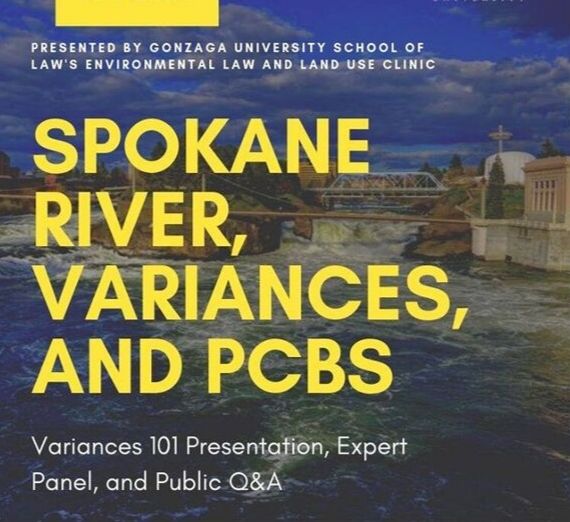Event Details
Date & Time
Tuesday, Oct 08, 2019 6:00 PM - 8:00 PM
Location
Barbieri Courtroom
Event Type & Tags
About This Event
This event will begin with a presentation on water quality standard variances and the current process in place with PCBs and the Spokane River. This presentation will be provided by student representative Ezekiel Denison who has been researching variances for a Rose Foundation Grant given to the Environmental Law Clinic. After the presentation, there will be time for each panel member to give comments on the Spokane variance process from their perspectives. The panel will include representatives from government, industry, and conservation groups.
The Spokane River between Spokane Valley and Long Lake Dam contains Polychlorinated Bi-phenyls (PCBs). PCBs are a group of persistent man-made compounds that permeate throughout the environment. Due to potential carcinogenic attributes and toxic effects to the immune, reproductive, nervous, and endocrine systems in people and other organisms, PCBs are classified by the Environmental Protection Agency as a “toxic pollutant.” Current regulations and lack of technological capabilities hinder the ability of most local facilities to detect and eliminate PCBs required by state law.
Water quality standards (WQS) are provisions of law that describe the desired condition of a water body and the means by which that condition will be protected or achieved. The purposes of WQS are to protect public health and welfare, enhance the quality of water, and comply with the Clean Water Act. A WQS variance is a regulatory tool that modifies the waterbody’s condition and criteria to allow a permit holder to discharge effluent at a more lenient standard than required by law for a time-limited period. Currently five facilities on the Spokane River have applied for a water quality standard variance related to PCBs.
If approved, these WQS variances for PCBs would be the first variance involving a toxic pollutant in the United States. Additionally, the variances would be a first of any variance in the State of Washington. This forum is designed to describe the nature, process, and effects of water quality standard variances related to PCBs and the Spokane River from a multitude of perspectives. There will be time at the end of the forum for the public to ask questions.
The panel of experts include:
• Ezekiel Denison – Gonzaga Law Student
• Cheryl Niemi – Department of Ecology
• Jerry White – Spokane Riverkeeper
• Bud Leber – Kaiser Aluminum
• Rob Lindsay – Spokane County Regional Water Reclamation Facility

